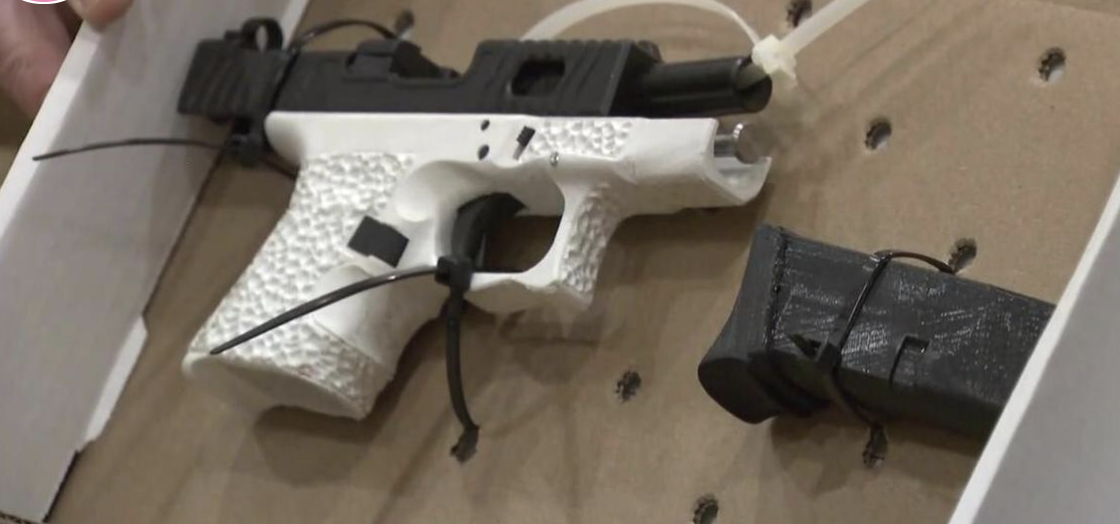After the 2021 ghost gun law passed in Nevada, Polymer80 hired the New York City law firm, Greenspoon Marder, to file the lawsuit in Yerington, an onion farming town that’s the seat of the county that’s home to Polymer80. One of the firm’s managing partners, James McGuire, traveled to Yerington to argue before Judge John Schlegelmilch that the law was written so vaguely it would be impossible to enforce and would be ripe for abuse.
McGuire said in an email he no longer represents Polymer80 and referred questions to another lawyer at the firm, who didn’t respond to requests for comment.
In court, McGuire argued the law failed to define key terms such as “receiver” and “frame” and used “murky and undefined terms” to explain what an “unfinished receiver” is. He also argued that the law doesn’t specify when an unfinished receiver becomes a receiver in the manufacturing process.
During two hearings on the lawsuit, Schlegelmilch seemed to have little patience with the state’s argument that the law relies on industry-specific terms well understood by Polymer80. Instead, the judge agreed with McGuire that the law didn’t adequately define an unfinished receiver. At one point, he asked whether his 5-year-old’s rubber band gun could be considered an unfinished receiver simply because it looks like a gun.
“What if I’m at home and machining a piece of wood? OK? And my 5-year-old wants a rubber band gun. OK? So, I take that piece of wood, I turn it, I make it into — you know, I take a band saw, and I cut out what looks like a firearm. And I put a couple of sticks on it so that you can put a rubber band on it when you push it up. You’ve seen a rubber band gun before, right? So, is that mostly completed?”
“I mean, a rubber band gun’s not a firearm,” the state’s attorney, Greg Zunino. “I don’t think you would ever be prosecuted under that scenario because you still have to have an intent to turn something into a firearm.”
Schlegelmilch ruled in favor of Polymer80 and enjoined the state from enforcing the section of the law that prohibited the possession and sale of unfinished frames and receivers. Schlegelmilch let stand the rest of the law, which Polymer80 didn’t challenge, and prohibits the possession of a completed ghost gun.
The state has appealed Schlegelmilch’s ruling to the Nevada Supreme Court.
Schlegelmilch declined an interview request because the appeal is pending.
[Polymer80 president Loran] Kelley declined to comment on the decision to file the lawsuit on his home turf in Lyon County.
Other courts have ruled differently.
A similar lawsuit filed in federal court in Reno the same month was quickly tossed by a judge who decided the law “is a valid exercise of the government’s police power.”
“What happened here, with the state court being more successful for them, indicates politics and ideology within the judiciary,” [Giffords deputy chief counsel David] Pucino said.
This month, a Washington, D.C. judge found Polymer80 sold illegal firearms in the district and ordered it to pay $4 million in penalties.
The ATF is also seeking to impose a new rule requiring unfinished receivers and frames to include a serial number — one of the federal strategies that Pucino said would be more effective than a state-by-state approach. The new rule, seen as a way to close the ghost gun loophole, is set to take effect on Aug. 24, but it faces at least three lawsuits from the ghost gun industry seeking to block its implementation.
McGuire, the lawyer who represented Polymer80, authored a 27-page public comment submission on the new rule arguing, in part, that it’s impermissibly vague, the same argument that he used successfully to stop the Nevada law.
There’s an easy solution to some: Polymer80 could stamp serial numbers on the unfinished frames and receivers they sell.
Kelley said putting a serial number on his products wouldn’t hurt his company. But using those numbers to require background checks is a “critical threat” to his business, which he said relies on a growing market of individuals who “value their Fourth Amendment rights” to privacy.
“There’s a problem when people’s right to privacy is infringed, and a government agency is looking at what you bought whenever they want,” he said.
— Anjeanette Damon in Why Outlawing Ghost Guns Didn’t Stop America’s Largest Maker of Ghost Gun Parts


